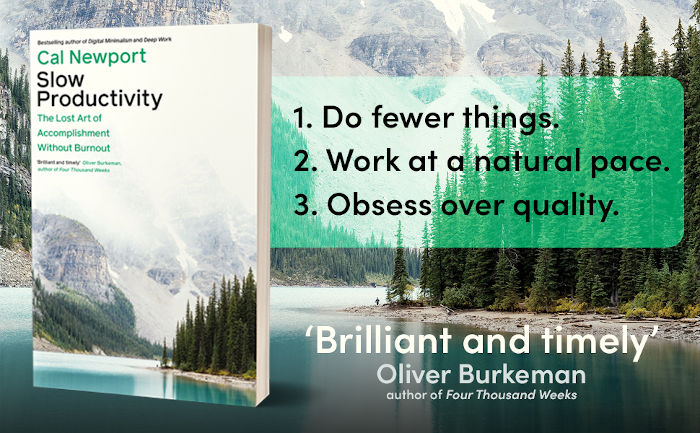What does ‘productivity’ even mean? Read an excerpt from Slow Productivity: The Lost Art of Accomplishment Without Burnout by Cal Newport
More about the book!

Penguin Random House SA has shared an excerpt from Slow Productivity: The Lost Art of Accomplishment Without Burnout by Cal Newport.
Today we’re either sacrificing ourselves on the altar of success or we’re rejecting the idea of ambition entirely. But it doesn’t have to be all or nothing. There is a way to create meaningful work as part of a balanced life, and it’s called ‘slow productivity’.
Coined by Newport, the bestselling author of Deep Work and Digital Minimalism, slow productivity is a revolutionary philosophy based on simple principles.
From managing your energy according to the season, to identifying which projects to pursue and which to set aside, to building a schedule that yields maximum output with minimum stress, this timely and essential book will revolutionise how you work, helping you to accomplish great things at a more humane pace.
Read an excerpt:
~~~
1: The Rise and Fall of Pseudo-Productivity
In the summer of 1995, Leslie Moonves, the newly appointed head of entertainment for CBS, was wandering the halls of the network’s vast Television City headquarters. He was not happy with what he saw: it was 3:30 p.m. on a Friday, and the office was three quarters empty. As the media journalist Bill Carter reports in Desperate Networks, his 2006 book about the television industry during this period, a frustrated Moonves sent a heated memo about the empty office to his employees. ‘Unless anybody hasn’t noticed, we’re in third place [in the ratings],’ he wrote. ‘My guess is that at ABC and NBC they’re still working at 3:30 on Friday. This will no longer be tolerated.’
On first encounter, this vignette provides a stereotypical case study about the various ways the knowledge sector came to think about productivity during the twentieth century: ‘Work’ is a vague thing that employees do in an office. More work creates better results than less. It’s a manager’s job to ensure enough work is getting done, because without this pressure, lazy employees will attempt to get away with the bare minimum. The most successful companies have the hardest workers.
But how did we develop these beliefs? We’ve heard them enough times to convince ourselves that they’re probably true, but a closer look reveals a more complicated story. It doesn’t take much probing to discover that in the knowledge work environment, when it comes to the basic goal of getting things done, we actually know much less than we’re letting on …
What Does ‘Productivity’ Mean?
As the full extent of our culture’s growing weariness with ‘productivity’ became increasingly apparent in recent years, I decided to survey my readers about the topic. My goal was to nuance my understanding of what was driving this shift. Ultimately, close to seven hundred people, almost all knowledge workers, participated in my informal study. My first substantive question was meant to be easy; a warm-up of sorts: ‘In your particular professional field, how would most people define “productivity” or “being productive”?’ The responses I received to this initial query, however, surprised me. The issue was less what they said than what they didn’t. By far the most common style of answer simply listed the types of things the respondent did in their job.
‘Producing content and services for the benefit of our member organizations,’ replied an executive named Michael. ‘The ability to produce [sermons] while simultaneously caring for your flock via personal visits,’ said a pastor named Jason. A researcher named Marianna pointed to ‘attending meetings … running lab experiments … and producing peer-reviewed articles’. An engineering director named George defined productivity to be ‘doing what you said you would do’.
None of these answers included specific goals to meet, or performance measures that could differentiate between doing a job well versus badly. When quantity was mentioned, it tended to be in the general sense that more is always better. (Productivity is ‘working all the time’, explained an exhausted postdoc named Soph.) As I read through more of my surveys, an unsettling revelation began to emerge: for all of our complaining about the term, knowledge workers have no agreed-upon definition of what ‘productivity’ even means.
~~~
- Extracted from Slow Productivity by Cal Newport, out now from Penguin Random House SA!
Categories International Non-fiction
Tags Book excerpts Book extracts Cal Newport Penguin Random House SA Slow Productivity
